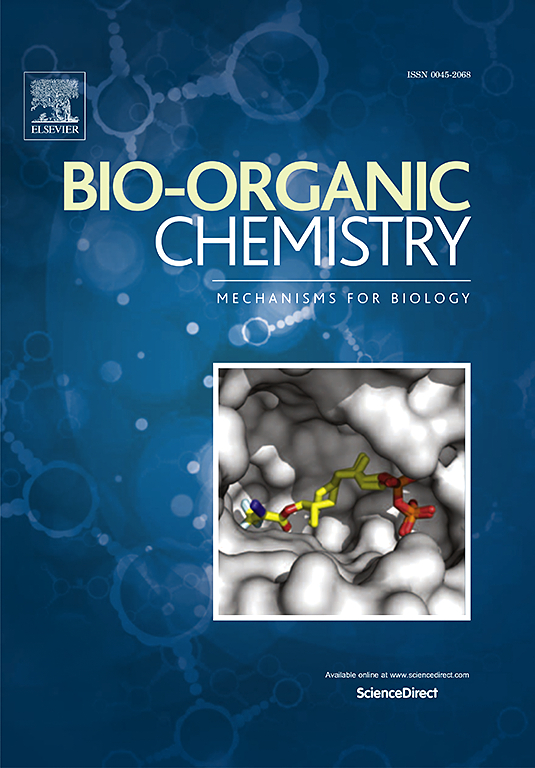基于益生菌衍生的胞外多糖氧化锌纳米颗粒:一种结肠癌基因调节的新方法。
IF 4.7
2区 医学
Q1 BIOCHEMISTRY & MOLECULAR BIOLOGY
引用次数: 0
摘要
世界上第二致命的癌症是结肠直肠癌(CRC),它是由结肠上皮细胞不受控制的增殖引起的。本研究探讨了关键基因在SW480细胞系中的作用,包括肿瘤抑制基因ING4和APC、血管生成相关的DHX32和致癌突变p53。益生菌及其胞外多糖(EPS)成分具有抗氧化和抗癌作用,在癌症预防和治疗中具有潜在的应用价值。氧化锌纳米颗粒(ZnONPs)以其独特的物理和化学特性而闻名,在药物输送、癌症诊断和治疗方面有着广泛的应用。本课题从植物乳杆菌中提取EPS,用于ZnONPs的生物合成,并通过UV-VIS、XRD、FTIR、FE-SEM和zeta电位分析进行表征。研究了EPS和ZnONPs对SW480细胞的细胞毒作用及其抗氧化性能。实时荧光定量PCR结果显示,靶向药物治疗后,DHX32和P53基因表达降低,ING4和APC基因表达升高。这些发现表明,益生菌衍生的EPS和ZnONPs可能通过调节参与疾病进展的关键基因表达,为结直肠癌治疗提供有效的策略。本文章由计算机程序翻译,如有差异,请以英文原文为准。

Probiotic-based derived exopolysaccharide-zinc oxide nanoparticles: a novel approach to colorectal cancer gene modulation
The second deadliest cancer in the world is colorectal cancer (CRC), which is caused by the uncontrolled proliferation of epithelial cells in the colon. This research examines the role of key genes—including tumor suppressors ING4 and APC, angiogenesis-related DHX32, and the oncogenic mutated P53—in the SW480 cell line. Probiotics and their exopolysaccharide (EPS) component show potential in cancer prevention and treatment due to their antioxidant and anti-cancer properties. Zinc oxide nanoparticles (ZnONPs), recognized for their unique physical and chemical characteristics, have broad applications in drug delivery, cancer diagnostics, and therapy. In this project, EPS was extracted from Lactiplantibacillus plantarum and used for ZnONPs biosynthesis, followed by characterization through UV–VIS, XRD, FTIR, FE-SEM, and zeta potential analysis. Cytotoxic effects of EPS and ZnONPs were evaluated on SW480 cells, along with their antioxidant properties. Quantitative real-time PCR analysis revealed decreased expression of DHX32 and P53, while ING4 and APC gene expression increased following treatment of the cancerous cell line with target agents. These findings suggest that probiotic-derived EPS and ZnONPs may offer effective strategies for CRC treatment by modulating critical gene expression involved in disease progression.
求助全文
通过发布文献求助,成功后即可免费获取论文全文。
去求助
来源期刊

Bioorganic Chemistry
生物-生化与分子生物学
CiteScore
9.70
自引率
3.90%
发文量
679
审稿时长
31 days
期刊介绍:
Bioorganic Chemistry publishes research that addresses biological questions at the molecular level, using organic chemistry and principles of physical organic chemistry. The scope of the journal covers a range of topics at the organic chemistry-biology interface, including: enzyme catalysis, biotransformation and enzyme inhibition; nucleic acids chemistry; medicinal chemistry; natural product chemistry, natural product synthesis and natural product biosynthesis; antimicrobial agents; lipid and peptide chemistry; biophysical chemistry; biological probes; bio-orthogonal chemistry and biomimetic chemistry.
For manuscripts dealing with synthetic bioactive compounds, the Journal requires that the molecular target of the compounds described must be known, and must be demonstrated experimentally in the manuscript. For studies involving natural products, if the molecular target is unknown, some data beyond simple cell-based toxicity studies to provide insight into the mechanism of action is required. Studies supported by molecular docking are welcome, but must be supported by experimental data. The Journal does not consider manuscripts that are purely theoretical or computational in nature.
The Journal publishes regular articles, short communications and reviews. Reviews are normally invited by Editors or Editorial Board members. Authors of unsolicited reviews should first contact an Editor or Editorial Board member to determine whether the proposed article is within the scope of the Journal.
 求助内容:
求助内容: 应助结果提醒方式:
应助结果提醒方式:


